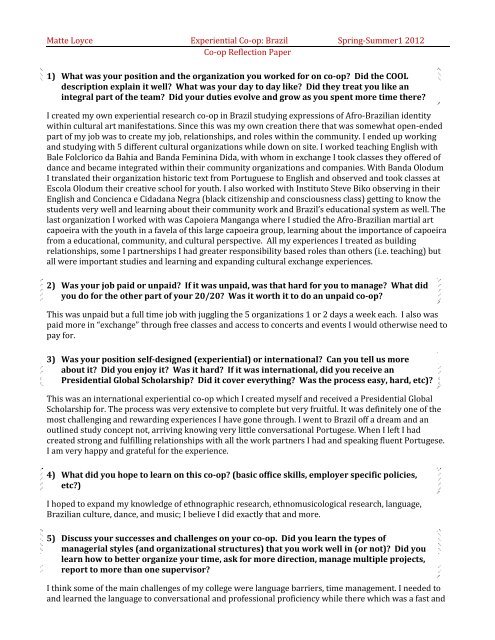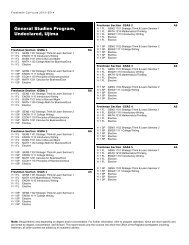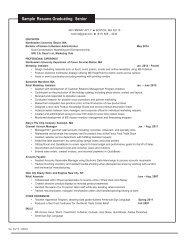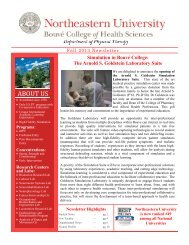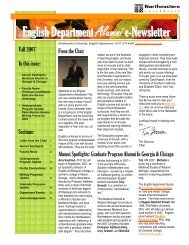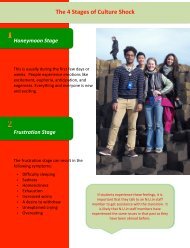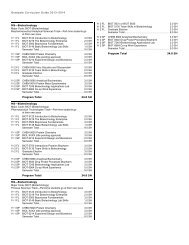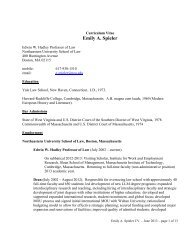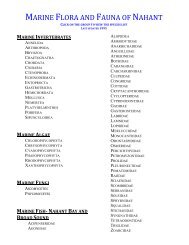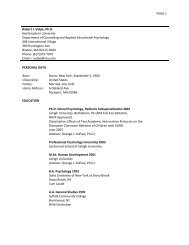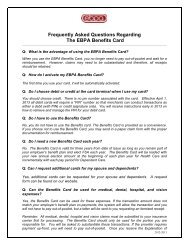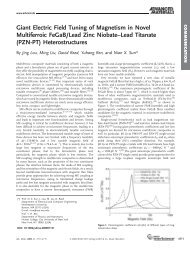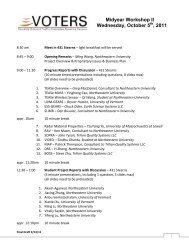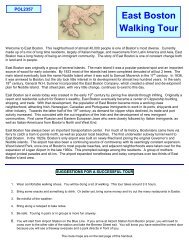Reflection Paper
Reflection Paper
Reflection Paper
You also want an ePaper? Increase the reach of your titles
YUMPU automatically turns print PDFs into web optimized ePapers that Google loves.
Matte Loyce Experiential Co-op: Brazil Spring-Summer1 2012<br />
Co-op <strong>Reflection</strong> <strong>Paper</strong><br />
1) What was your position and the organization you worked for on co-op? Did the COOL<br />
description explain it well? What was your day to day like? Did they treat you like an<br />
integral part of the team? Did your duties evolve and grow as you spent more time there?<br />
I created my own experiential research co-op in Brazil studying expressions of Afro-Brazilian identity<br />
within cultural art manifestations. Since this was my own creation there that was somewhat open-ended<br />
part of my job was to create my job, relationships, and roles within the community. I ended up working<br />
and studying with 5 different cultural organizations while down on site. I worked teaching English with<br />
Bale Folclorico da Bahia and Banda Feminina Dida, with whom in exchange I took classes they offered of<br />
dance and became integrated within their community organizations and companies. With Banda Olodum<br />
I translated their organization historic text from Portuguese to English and observed and took classes at<br />
Escola Olodum their creative school for youth. I also worked with Instituto Steve Biko observing in their<br />
English and Concienca e Cidadana Negra (black citizenship and consciousness class) getting to know the<br />
students very well and learning about their community work and Brazil’s educational system as well. The<br />
last organization I worked with was Capoiera Manganga where I studied the Afro-Brazilian martial art<br />
capoeira with the youth in a favela of this large capoeira group, learning about the importance of capoeira<br />
from a educational, community, and cultural perspective. All my experiences I treated as building<br />
relationships, some I partnerships I had greater responsibility based roles than others (i.e. teaching) but<br />
all were important studies and learning and expanding cultural exchange experiences.<br />
2) Was your job paid or unpaid? If it was unpaid, was that hard for you to manage? What did<br />
you do for the other part of your 20/20? Was it worth it to do an unpaid co-op?<br />
This was unpaid but a full time job with juggling the 5 organizations 1 or 2 days a week each. I also was<br />
paid more in “exchange” through free classes and access to concerts and events I would otherwise need to<br />
pay for.<br />
3) Was your position self-designed (experiential) or international? Can you tell us more<br />
about it? Did you enjoy it? Was it hard? If it was international, did you receive an<br />
Presidential Global Scholarship? Did it cover everything? Was the process easy, hard, etc)?<br />
This was an international experiential co-op which I created myself and received a Presidential Global<br />
Scholarship for. The process was very extensive to complete but very fruitful. It was definitely one of the<br />
most challenging and rewarding experiences I have gone through. I went to Brazil off a dream and an<br />
outlined study concept not, arriving knowing very little conversational Portugese. When I left I had<br />
created strong and fulfilling relationships with all the work partners I had and speaking fluent Portugese.<br />
I am very happy and grateful for the experience.<br />
4) What did you hope to learn on this co-op? (basic office skills, employer specific policies,<br />
etc?)<br />
I hoped to expand my knowledge of ethnographic research, ethnomusicological research, language,<br />
Brazilian culture, dance, and music; I believe I did exactly that and more.<br />
5) Discuss your successes and challenges on your co-op. Did you learn the types of<br />
managerial styles (and organizational structures) that you work well in (or not)? Did you<br />
learn how to better organize your time, ask for more direction, manage multiple projects,<br />
report to more than one supervisor?<br />
I think some of the main challenges of my college were language barriers, time management. I needed to<br />
and learned the language to conversational and professional proficiency while there which was a fast and
extremely developmental experience. I also had the challenge of organizing work with 5 separate<br />
organizations on my own; negotiating schedules, employment, classes, responsibilities and needs all on<br />
my own. This was a challenging but very fun experience truly leaving all fears behind and finding out<br />
create relationships with patience and persistence.<br />
6) How was the preparation (resumes, etc) and interviewing process (before this co-op) for<br />
you (in general)? What did you learn from previous experience, or class, or peers? What<br />
are some tips you would share with students who are preparing to go on their first co-op?<br />
The preparation process included writing many project proposal, defining research and doing<br />
background work upon what I believe a possible objective could be from my experience. I also worked<br />
very closely with a mentor in San Francisco originally from Salvador, Bahia, Brazil who helped establish<br />
the connections with the organizations I worked with. In addition to academic work I took a lot of dance<br />
classes preparing for the physical and artistic engagement aspect of my research. The guidance I would<br />
give to any new co-ops is stay consistent and persistent with communication when trying to set up any<br />
projects. Often times you need to remind people of the jobs/projects you want to complete with them<br />
because many times they have other projects of their own. Take responsibility.<br />
7) Did you have or encounter any ethical dilemmas – or weird social situations occur while on<br />
co-op? (socializing outside of work, dating within the company, _______, questionable<br />
practices by a co-worker, office politics, etc.)….how did you handle them?<br />
I luckily did not encounter any ethical dilemmas in my job experience.<br />
8) How prepared do you feel you were to be an effective person in this position? What jobs or<br />
volunteering experience helped you in this job?<br />
I felt very prepared and unprepared at simultaneously. I was prepared to teach being a teacher for many<br />
years but I had never taught English to non-English speakers; also while in the process of learning the<br />
language my students. This proved challenging but extremely rewarding. I had never translated before<br />
but working and engaging really helped develop my Portuguese while I was in the process of learning the<br />
language through conversational life. I had a lot of experience dancing prior to my trip but I was dancing<br />
with a very advanced company which helped me develop immensely as a dancer and build on my<br />
foundation. I had never played capoeira but my dance and sports background helped me excel learning.<br />
9) Did any of your previous coursework help you be effective in this position? What type of<br />
coursework do you feel might have been useful prior to this co-op? Will this (and previous<br />
co-op experiences) help you next semester’s classes?<br />
Some of my previous course work helped like history of latin-amerinan society and development, my<br />
research methods course, and my education courses helped me with all my work.<br />
10) How did this co-op help you decide what you want to do next (in terms of career or work)?<br />
Any plans?<br />
This co-op helped me realize I want to work within the creative and cultural industry. I would also like to<br />
continue my work with education of both youth and adults (I taught all adults in Brazil) in some shape or<br />
form. I would like to contribute to, organize, and help support the cultural art community for my<br />
professional life, I just have yet to decide in what specific facet.


